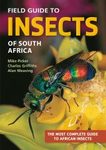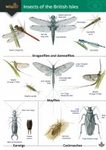"A landmark contribution, not just to entomology and evolutionary biology, but to the life sciences as a whole. Beautifully conceived, splendidly written, and exquisitely illustrated [...] Bound to remain a primary scientific reference for years to come. A must for naturalists, young and old. Truly a definitive work."
- Thomas Eisner, Cornell University, author of For Love of Insects
"[...] insects deserve the immense, sumptuously illustrated monograph text Grimaldi and Engel have now provided. Evolution of the Insects is a hugely impressive achievement. Throughout, the writing is clear and lively, the scholarship outstanding and the amount of information summarized vast. The enthusiasm of the authors for entomology shows in every aspect of this book, but the task of creating or assembling the images alone has evidently been a colossal labour of love. [...] for its wealth of insights, as well as its unprecedented scope and depth, this superlative synthesis should have a durable appeal not only to entomologists, but also to biologists in general."
- TRENDS in Ecology and Evolution
"There are a number of good entomology books on the market. Few, however, have integrated the living and fossil record as seamlessly as David Grimaldi and Michael Engel's Evolution of the Insects. None, moreover, has combined this integration with so much student-friendly text and such a wealth of illustrations (more than 900). The book shows that lavish photography and lucidity need not be the prerogative of popular entomology [...] Whatever is in store, Evolution of the Insects superbly documents the rich and colorful history of hexapods."
- Science
"[...] a 'must have' for anyone interested in this extraordinary group of organisms [...] the stress on the importance of insects in the daily life of the planet is one of the book's many strengths [...] a joy simply to browse, not only because of the high standard of the images [...] but also because of the discoveries to be made on every page [...]"
- BBC Wildlife
"Grimaldi and Engel, two entomologists, have produced a really excellent, beautifully illustrated account that will enthral both student and general reader. They have gone to town on the tome that is not just informative but also accessible and covers one of the most important topics in biology."
- New Scientist
"[...] the book whips up the mind without forgetting the eyes. I challenge anyone who opens its covers not to have one's eyes bamboozled by the visual treat within; fabulous photos of living insects, rare fossils and stunning electron micrographs and line drawings [...] a must for anyone even remotely interested in insects [...]"
- Nick Baker, author of The New Amateur Naturalist
"[...] the next great evolutionary jolt has been given to entomology by Grimaldi and Engel's book [...] I find the information presented is accurate and surprisingly detailed. Importantly, too, the text has a freshness and a new approach which can be lacking in books where specialists in the group are yet again asked to write a section. [...] This is quite simply a beautiful, comprehensive, amazingly good value book that is not just for entomologists and I would wager there will be few who do not have a copy on their shelves in a short time from now. It is also within the grasp of students as an excellent entomology textbook and is more than attractive enough for the general biologist/naturalist to be interested in [...] this book not only gives the science of entomology a new vitamin shot in the arm but it should also do much to increase the popularity of this animal group among the non specialists. Can you afford not to have a copy on your bookshelves/coffee table?"
- Biologist
"[...] this is the single, most authoritative up-to-date and beautiful book treating all insects and the most wonderfully written (the seamlessness with which one topic melts into another literally 'sucks one in' [...] reading this book will enable every entomologist to painlessly discover his or her roots."
- European Journal of Entomology
"Authoritative and encyclopaedic [...] Evolution of the Insects is the first book that has attempted to pull together and synthesize both fossil and recent evidence for insect evolution, and to present the information in an accessible, engaging way. They have succeeded to an unprecedented degree, and anyone with an active or passing interest in insects owes it to themselves to have a look [...] will fill a number of important roles; a text for the serious student of insects, a reference for a wealth of information on insect evolution, and a source of joy for the casual reader who picks it up and opens it to any of the hundreds of intriguing stories and examples it contains."
- The Times Literary Supplement
"[...] this is a superb book, and anyone who is not already an entomophile most likely will be after browsing through it."
- Palaeontological Association Newsletter
"[...] simply essential reading for anybody who is interested in the evolutionary history of insects, or any particular group of insects, including their systematics and historical bio-geography."
- Systematic Biology
"[...] lavishly illustrated with colour plates and some very nice drawings: this is a lovely book as well as a work of scholarship. [...] as a reference work on insect diversity, systematics and phylogeny with a broad view over historical time this is a magnificent book."
- Entomologia Generalis
"Evolution of the Insects cleverly intertwines history and the theoretical foundations of reconstructing evolution, illustrated by insect examples. Grimaldi has introduced an excitement and accessibility to the study of fossil insects that had been absent in a previously turgid and excessively technical literature. Here, the most important deposits that have given up fossils are presented in both their geographic and plate-tectonic contexts, helping us to grasp just how much, or how little, we know and the complex interplay of space and time in the origin of insects. What sets Evolution of Insects apart is the quality and quantity of illustrations: beautiful colour photographs; spectacular digital images; scanning electron micrographs; clever use of colour to unravel bits of complex anatomy; crisp diagrams; evolutionary trees; and the kind of skillful scientific illustrations that are widely identified with David Grimaldi's contributions to insect morphology.
This book is well written, logically presented, well referenced, easy to read and marvellously illustrated, mostly in colour [...] Each of the other chapters is an equal pleasure to read, and the average of at least one illustration per page is maintained throughout. Apart from being relevant to the text, some of the photographs of both living and fossil insects are so beautiful that the book might even have a casual 'coffee table' appeal. I am sure that I will use it much more frequently than many other reference books that I own, and I have no hesitation in recommending it to anyone with an interest in entomology."
- The Times Higher Education Supplement


































